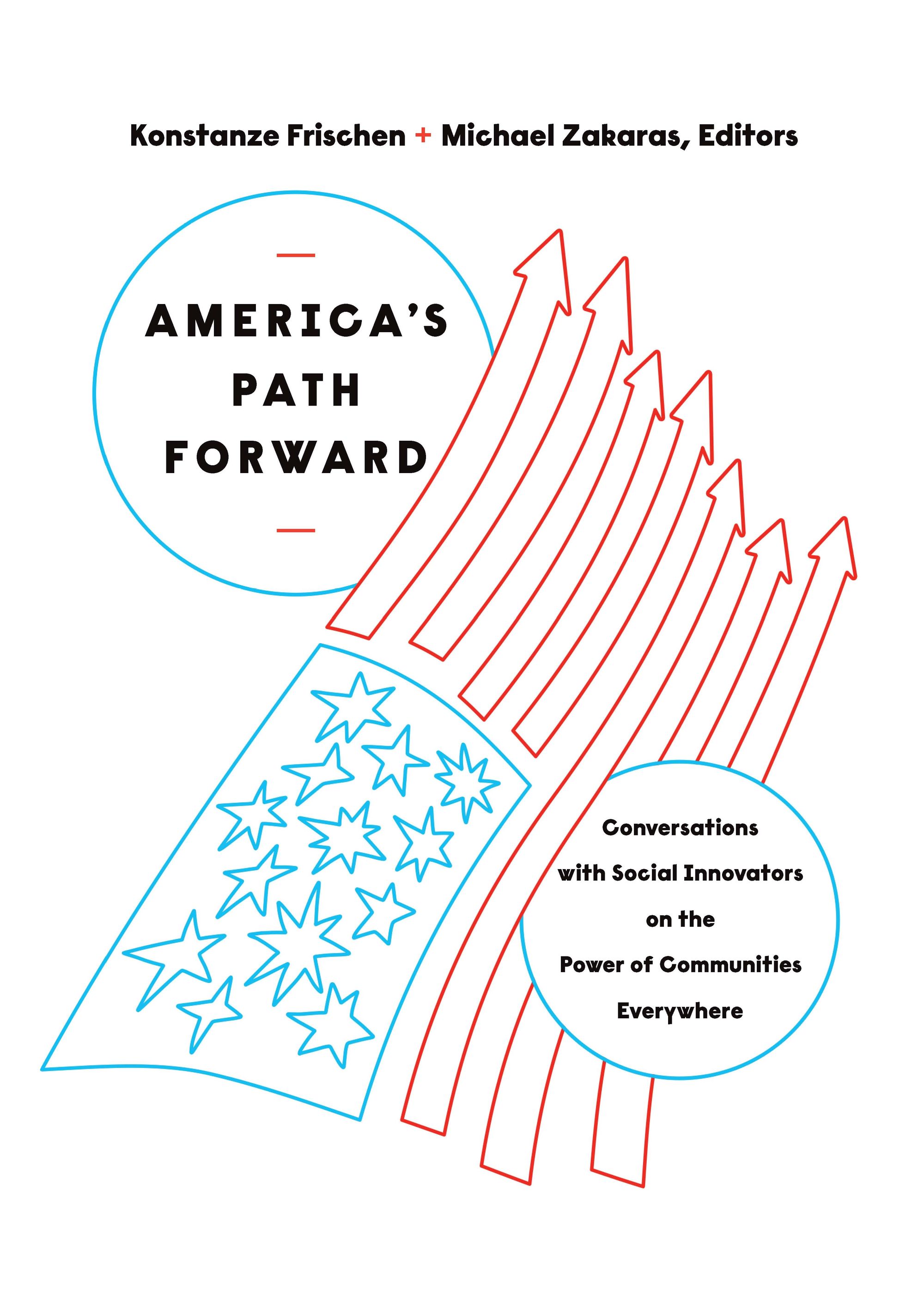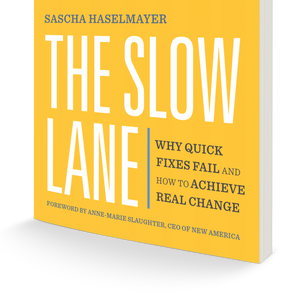What if we all looked at each other through a lens of possibilities? What if, instead of deficits, we saw other people and communities as inherently powerful? A new collection of interviews with 22 leaders of successful Slow Lane movements reveals a path forward: Trusting those closest to the problems, listening to their ideas, sticking around to help audacious new ideas take shape and remove the barriers to participation.
America's Path Forward / Lessons For All Of Us
A beautiful new book, “America's Path Forward: Conversations with Social Innovators on the Power of Communities Everywhere”, offers new hope, strategies, innovations, and insights for anyone who cares about changing things for the better. The interviews, led by the book's editors Konstanze Frischen and Michael Zakaras (both colleagues of mine at Ashoka), offer sharp and caring analysis, stories, and invaluable insights even for communities outside the United States. And they are a rich resource to see the Slow Lane Principles in action.

Even after reading, and re-reading America's Path Forward, I find it hard to do justice to the richness held in these concise and engaging interviews. An important part of this richness is made up by the perspective of people who come from all walks of life and who have set out to create real change in the economy, society, culture, and government: reinventing dying industries; overcoming divisions on gun control, education and race; rallying communities in support of people facing the criminal justice system, or helping young people of color enter the environmental movement; restoring ancient food practices to assert indigenous and women's self-determination; ending homelessness and giving young people a say in the foster care system; and invigorating democratic participation. (I have added a complete list of people and topics at the bottom of this post).
Here are four examples, of the kind of ideas and insights that can inspire all of us to see a new path forward, wherever we are.
Giving Children in Foster Care A Say In Their Life Plans
Each interview introduces us to the journeys of people who held no power in business or government. Like Sixto Cancel, the founder of Think of Us, an organization that helps children gain a say in the child welfare system.
“Stay in your place. You think you know better, but you don't.”
Sixto entered foster care—a system designed to keep toddlers safe for short periods of time—when he was just 11 months old. And only left it when he was 23. Like 78 percent of children in foster care, the system never found him a permanent home and unfit to help a young person develop. With devastating results: only 3 percent of people in foster care gain a college degree; 81% of males will experience an arrest by age 26; half will have no job or income, the other half will earn $12,000 a year on average. His lived experience helped Sixto unpack the brokenness of the system and develop new answers, giving young people a say in their life plan and curating supporters to help transition into independence, and realize their dreams.
A Better Ocean Economy, With Working-Class Values
Or meet Bren Smith, who became an ocean farmer after a lifelong career as a fisherman that was halted by decline due to overfishing. His organization, GreenWave, helps thousands of fishermen around the world become vertical farmers, under the sea, growing seaweed and shellfish.
“If that's what the climate movement is offering me, a cubicle class and some weird remote farming from my desktop-log on as a robotic boat and a low carbon footprint- I'm out.”
“That you supposedly have to be an Amazon to fight climate change. You've got to be an Elon Musk. But to tackle what lies ahead, we also need to tap into this wellspring of what I call blue-collar and community innovation.”
Bren reveals his journey as a worker entering the green economy, and how he succeeded in creating a pathway for other fishermen like himself to create a more sustainable livelihood. His recipe is distinctly Slow Lane, when he says that there is no quick fix, no silver bullet. Instead of maintaining the myth of heroic geniuses and Ocean-Tech Startup growth, he questions that solutions to climate change have to be profitable for investors. Instead, GreenWave is radically open source, promoting the widest possible spread, adaptation, and bundling of what works. Along the way, this lack of competition for dominance allows new bridges to be built: After generations of rivalry for fishing grounds, Indigenous people participate in GreenWave to create ocean farms for their communities.
Correcting The Negative Framing Of Black Communities
In an interview about race and the power of asset-framing, Trabian Shorters unveils the damage done by organizations and institutions that label black people by the injustices, disparities, and needs they experience. Like “at-risk, low-income, minorities in high-crime, high-poverty, disadvantaged communities”.
“At so at some point, I just realized that we're leaning our ladders up against the wrong narrative. You can't lift someone up by putting them down.”
His insight, long validated in cognitive psychology, was that the first label frames the person you meet. That happens a lot, for example in social impact circles, where it has become the norm to focus on deficits when describing a problem to be solved. Which feeds the stigmatization of people who also have a lot of positive things going on in their lives. Trabian provides a typical example: A guidance councilor in high school will encourage a black student to tell the story of their horrible background to get scholarships. This negative narrative ends up becoming the young person's defining story, seemingly the only way to get seen by a society.
Asset-framing flips this negative framing, and is at the heart of what Trabian practices through his organization BMe Community, an award-winning community of black leaders. Asset-framing defines people by their aspirations, their contributions, what they're good at. Consistently applying this method is liberating not just individually, but changes the bigger narratives in society. It can remind people that poor people aspire, too. And that they contribute. With time, our reading of people living in poverty begins to separate their aspirations and dreams, things we can all relate to, from their unearned obstacles. This reframing happens at different levels: working with individual leaders, with communities, with philanthropy, and journalism.
Deep, Loving Permanence For Young People
I found the interview with Sarah Hemminger, the founder of Thread, uniquely powerful and moving. She shows the impact of building durable, long-term relationships in communities. Or, what I call the power of permanence, of staying for as long as it takes.
“When young people join Thread, we commit to them for ten years—the remainder of high school and six years after. And during that time, we are building diverse, loving, durable, committed relationships with them and around them. We call it “doing life together”.”
Sarah's organization targets students who academically perform in the bottom 25 percent of 9th grade classes in Baltimore, and matches them up with volunteers. Who in turn are supported by other volunteers. The results are breathtaking: where only 6 percent of peers will graduate in four years, Thread's graduation rate if 65 percent. 62 percent will complete further education. And 100 percent remain enrolled in Thread for the full ten-year relationship.
“Building deep and permanent relationships that will allow students access to resources, networks that help remove barriers along the way as life happens. I think it is natural that this occurs across longer time horizons. This is much more foundational than programs or interventions.”
This long-term approach, starting with a ten-year commitment to a young person, reveals just what it can take to build trust. Sarah recalls several examples where volunteers showed up every day for months on end, before the young person would engage, seeing that their motivation was sincere. Thread's deep, patient and caring support, including volunteers supporting volunteers, reminds me of why the Fast Lane keeps deepening our divisions. Staying for as long as it takes, is the essence of creating pathways for people to find their purpose, their power, their courage.
A Caring Little Book With Rewarding Insights
These are just four examples of the 22 interviews that make up America's Path Forward. The editors of the book, Konstanze Frischen and Michael Zakaras, both leaders at Ashoka, do a beautiful job at interviewing with these extraordinary people, all Ashoka Fellows, who are building movements to tackle some of the biggest challenges in America today.
In the Reflection, the editors highlight what many of these stories have in common. Insights, that resonate strongly with the Slow Lane Principles. First, we need to look at each other through a lens of possibilities, betting on the wisdom of those closest to the problem. And unleashing their capabilities. Second, it means lending time and resources to help their ideas gain traction. And third, to remove the barriers that hold people back on their journey to participate in real change.
Amen to that.
Who Was Interviewed For America's Path Forward?
Sarah Horowitz on the power of mutualism; Bren Smith on ocean farming; T. Morgan Dixon on radical self-care and joy; David Lubell on making immigration welcoming to all; Trabian Shorters on race and the power of asset-framing; Casey Woods on gun ownership; Nick Tilsen on indigenous self-determination; Mauricio Lim Miller on why people don't need charity; Brandon Dennison on rebuilding the Appalachian economy; Denisa Livingston on the power of healthy food on Indian land; Raj Jayadev on ordinary peope ending mass incarceration; Laura Emiko Soltis on public education for undocumented people; Albert Fox Cahn on defending digital privacy; Sixto Cancel on young people taking charge of foster care; Sarah Hemminger on supporting young people; Will Jackson on black parents protecting black genious; Angelou Ezeilo on the privilege of feelings afe outdoors; Tim Lampkin on builcing black community wealth; Alison Lingane on employee ownership; Rosanne Haggerty on ending homelessness; and Eric Liu on revitalizing citizenship.



